Baptism
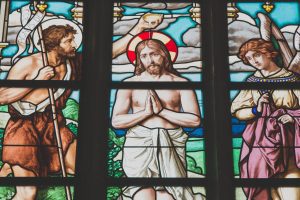 Jesus said, “Amen, amen, I say to you, no one can enter the kingdom of God without being born of water and Spirit.” (Jn 3:5) Baptism is the way that we as Catholics accept Jesus into our lives. Our “Yes” to God opens for us a life of grace with God. We become forever a son or daughter of the Most High. Moreover, Jesus cleanses us from our sins, for God did not just cover us with His blood, but washed us in the blood of the Lamb (Rev 7:13-14). The power of the blood of the Lamb makes us clean and conquers our sins! We are infused with the three theological virtues of Faith, Hope and Charity. As sinful as we may be, God makes us Holy and cares for us in Baptism. He never abandons us once we become His child. If you want to become a child of the good Heavenly Father and you are an adult, you may join the RCIA classes.
Jesus said, “Amen, amen, I say to you, no one can enter the kingdom of God without being born of water and Spirit.” (Jn 3:5) Baptism is the way that we as Catholics accept Jesus into our lives. Our “Yes” to God opens for us a life of grace with God. We become forever a son or daughter of the Most High. Moreover, Jesus cleanses us from our sins, for God did not just cover us with His blood, but washed us in the blood of the Lamb (Rev 7:13-14). The power of the blood of the Lamb makes us clean and conquers our sins! We are infused with the three theological virtues of Faith, Hope and Charity. As sinful as we may be, God makes us Holy and cares for us in Baptism. He never abandons us once we become His child. If you want to become a child of the good Heavenly Father and you are an adult, you may join the RCIA classes.
Forgiveness of sins can be obtained from the faith of others. Here is the story a paralytic’s sins being forgiven by the faith of his friends:
 ‘And some men brought on a stretcher a man who was paralyzed; they were trying to bring him in and set (him) in his presence. But not finding a way to bring him in because of the crowd, they went up on the roof and lowered him on the stretcher through the tiles into the middle in front of Jesus. When he saw their faith, he said, ‘As for you, your sins are forgiven.’” (Luke 5:18-20)
‘And some men brought on a stretcher a man who was paralyzed; they were trying to bring him in and set (him) in his presence. But not finding a way to bring him in because of the crowd, they went up on the roof and lowered him on the stretcher through the tiles into the middle in front of Jesus. When he saw their faith, he said, ‘As for you, your sins are forgiven.’” (Luke 5:18-20)
Since we know Jesus does not turn away children (Mt 19:14), it has always been the Christian practice that babies can be baptized into the faith upon the faith of the parents. If you have a child who needs baptism, here is the form to fill out BAPTISM REGISTRATION – English or BAPTISM REGISTRATION – Spanish.
When you are done filling out the Baptismal form, come in and we will be happy to set a time for the baptism and go over some expectations. Please also bring a copy of the birth certificate.
Phone # 1-815-232-8271
229 W Washington Place
Freeport, IL 61032
Confession
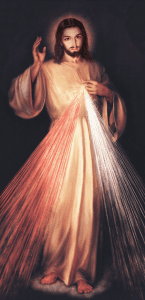 Jesus said to Peter, our first pope, “Whatever you bind on earth shall be bound in heaven; and whatever you loose on earth shall be loosed in heaven.” (Mt 16:19) Jesus here gives Peter and his successors the ability to forgive sins. It makes us nervous to think of confessing our sins, but it is something healthy for us. We spend millions of dollars a year telling counselors our faults, and we pay them! Priests are willing to hear our sins for free! Not only that, but priests have the power to reconcile us back to God. It is the power of God working through the priest. It is not dependent on the priest or how holy he may or may not be.
Jesus said to Peter, our first pope, “Whatever you bind on earth shall be bound in heaven; and whatever you loose on earth shall be loosed in heaven.” (Mt 16:19) Jesus here gives Peter and his successors the ability to forgive sins. It makes us nervous to think of confessing our sins, but it is something healthy for us. We spend millions of dollars a year telling counselors our faults, and we pay them! Priests are willing to hear our sins for free! Not only that, but priests have the power to reconcile us back to God. It is the power of God working through the priest. It is not dependent on the priest or how holy he may or may not be.
Confession is God’s way of saying that He still loves you. When you hear the words of absolution, you are hearing God say His words of love, and this builds up your faith in Him. There is no sin too great for Jesus to forgive. His love is more powerful than any sin. Why not go today? (Link to confession times)
Who can go to confession? Any Catholic who is of age to receive the Eucharist and has sins to be rid of.
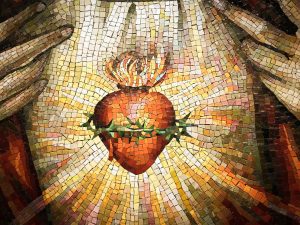 How do I go to confession? Click on the link above for confession times at our parishes. If you are not in Freeport, look up the local Catholic Church to find confession times. This is the format of confession:
How do I go to confession? Click on the link above for confession times at our parishes. If you are not in Freeport, look up the local Catholic Church to find confession times. This is the format of confession:
First, we start with what we call an examination of conscience. This is where we discern our relationship with Jesus. Have we done something that has offended Him? We typically use the Ten Commandments for this. This is the foundation which we start with. There may be other criteria, like forgiveness, gossip, anger or greed. There are many different reflections to help us through this process each time we go to confession. It is suggested to go once a month. Here is an examination of Conscience you can use.
Here is an Examination of Conscience to help you confess your sins.
Begin Confession with:
1) In the name of the Father, and of the Son, and of the Holy Spirit. (while making the sign of the cross)
2) Bless me Father for I have sinned, it has been _____ (state how long it has been) since my last confession.
3) Tell the sins you want to confess. Mortal Sins must be given in kind (what was done) and number (how many times). Venial sins are not necessary to say, but good to confess.
4) Finish with “For all these sins and for the sins I do not remember I ask for penance and absolution.”
5) Listen to the priest as he may give spiritual advice and then give you a penance.
6) Pray the Act of contrition:
O, my God, I am heartily sorry for having offended thee, and I detest all my sins because of thy just punishments; but most of all because I have offended thee, My God, who art all-good and deserving of all my love. I firmly resolve, with the help of thy grace, to do my penance, to sin no more, and to avoid the near occasion of sin. Amen.
7) The priest will give absolution (the prayer where your receive God’s mercy). Make the sign of the cross when you hear him say, “… and I absolve you in the name of the Father, and of the Son, and of the Holy Spirit.”
8) Tell the priest “thank you,” then you may leave the confessional and make sure you say the penance.
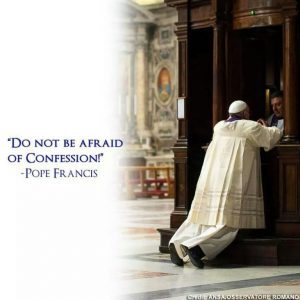
Confession times:
Saturdays 8:30-9:00am in St Joseph Church
Saturday 4:30-5:15pm in St Joseph Church
Tuesday Morning after Mass till 9am in St Mary Church
Tuesday evening at 4:30pm till 5:20pm in St Joseph Church
Thursday evening (Spanish) at 6pm in St Mary Church
First Communion
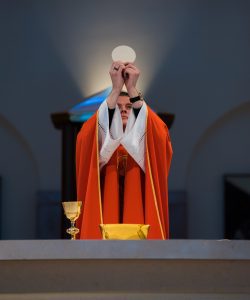 Jesus said, “Amen, amen, I say to you, unless you eat the flesh of the Son of Man and drink his blood, you do not have life within you.” (Jn 6:53) The Catholic Church teaches that the Eucharist is the Body and Blood of Jesus. By the very words of consecration the priest says, “this is my Body, which will be given up for you” and “This is… My Blood..which will be poured out..” taken from Matthew 26: 26-28. Jesus is so adamant about the Eucharist being His body and Blood that he is even willing to let many of His followers leave Him and His teaching and never come back (Jn 6:66).
Jesus said, “Amen, amen, I say to you, unless you eat the flesh of the Son of Man and drink his blood, you do not have life within you.” (Jn 6:53) The Catholic Church teaches that the Eucharist is the Body and Blood of Jesus. By the very words of consecration the priest says, “this is my Body, which will be given up for you” and “This is… My Blood..which will be poured out..” taken from Matthew 26: 26-28. Jesus is so adamant about the Eucharist being His body and Blood that he is even willing to let many of His followers leave Him and His teaching and never come back (Jn 6:66).
Why would God want to institute such a strange sacrament? What happens to the body happens to the soul. When we receive Jesus in the Eucharist, He enters our body. If this happens to our body, it also happens to our soul; Jesus enters us! It is a renewal of the reciprocal gift of self. We give ourselves to Jesus, and He gives Himself to us. Participating in the gift physically makes the gift more whole and therefore integrated. It is God’s way of giving us a physical expression of love for us. It is a partaking of the one-flesh union with God! Therefore, as Catholics, we do not have a personal relationship with Jesus, we have an intimate relationship with Him!
Like Marriage, responsibility comes with such a great gift. That is why those who are not Catholic or in the state of mortal sin should not receive the Eucharist in Holy Communion. Paul wrote to the Corinthians: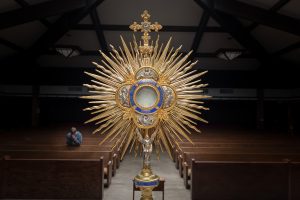
The cup of blessing that we bless, is it not a participation in the blood of Christ? The bread that we break, is it not a participation in the body of Christ? Because the loaf of bread is one, we, though many, are one body, for we all partake of the one loaf.…For I received from the Lord what I also handed on to you, that the Lord Jesus, on the night he was handed over, took bread, and, after he had given thanks, broke it and said, “This is my body that is for you. Do this in remembrance of me.” In the same way also the cup, after supper, saying, “This cup is the new covenant in my blood. Do this, as often as you drink it, in remembrance of me.” For as often as you eat this bread and drink the cup, you proclaim the death of the Lord until he comes. Therefore whoever eats the bread or drinks the cup of the Lord unworthily will have to answer for the body and blood of the Lord. A person should examine himself, and so eat the bread and drink the cup.
For anyone who eats and drinks without discerning the body, eats and drinks judgment on himself. (Cor. 10:16-17& 11:23-29)
If you desire intimacy with Jesus in the Eucharist and an adult, you can join in our RCIA (Rite of Christian Initiation for Adults) classes to prepare yourself in such a wonderful gift.
If you have children who you want to receive communion click here to find out more.
Confirmation
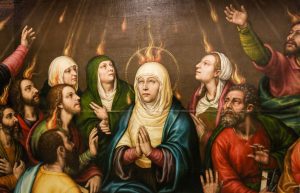 When the Apostles heard that Samaria had been converting, they realized that the Holy Spirit, “had not yet fallen upon any of them; they had only been baptized in the name of the Lord Jesus. Then they laid hands on them and they received the Holy Spirit.” (Act 8:16-17). In baptism we received the Holy Spirit in a way to develop our relationship with the Blessed Trinity. In Confirmation, we receive the Holy Spirit to go out and bring the Good News to others. We are made “Soldiers of Christ.” This is not a physical waging of war, but a spiritual responsibility to live up to the standards set by Jesus. St Francis of Assisi is known to say, “Always preach the Gospel, and when necessary, use words.” Confirmation gives us the grace we need to do this.
When the Apostles heard that Samaria had been converting, they realized that the Holy Spirit, “had not yet fallen upon any of them; they had only been baptized in the name of the Lord Jesus. Then they laid hands on them and they received the Holy Spirit.” (Act 8:16-17). In baptism we received the Holy Spirit in a way to develop our relationship with the Blessed Trinity. In Confirmation, we receive the Holy Spirit to go out and bring the Good News to others. We are made “Soldiers of Christ.” This is not a physical waging of war, but a spiritual responsibility to live up to the standards set by Jesus. St Francis of Assisi is known to say, “Always preach the Gospel, and when necessary, use words.” Confirmation gives us the grace we need to do this.
We cooperate with God’s grace given in confirmation. We need to form our minds to the ways of Jesus in order to do His 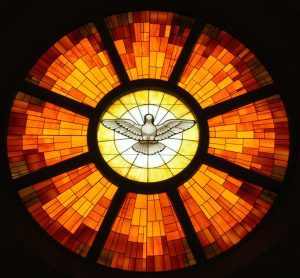 holy will. We need to discern God’s will because His grace is given to do His will. In doing His will, we come even closer to our Lord Jesus and our relationship strengthens and matures.
holy will. We need to discern God’s will because His grace is given to do His will. In doing His will, we come even closer to our Lord Jesus and our relationship strengthens and matures.
If you are an adult who would like to be confirmed click here to find out how.
If you have children who you or they want to be confirmed click here to find out how.
Other scripture to look up: Acts 19:6/ 2 Cor 1:21-22/ Eph 1:13
Marriage
 Holy Matrimony is a life-changing event, and for good reason. God instituted marriage when He “created man in his image; in the divine image he created him; male and female he created them.” (Gen 1:27) Marriage is instituted to be an image of God. Next He tells them, “Be fruitful and multiply” (Gen 1:28). It is not something merely to have children, but is called to bear spiritual fruit. Ephesians 5:21-32 has one of the most beautiful explanations of marriage in scripture:
Holy Matrimony is a life-changing event, and for good reason. God instituted marriage when He “created man in his image; in the divine image he created him; male and female he created them.” (Gen 1:27) Marriage is instituted to be an image of God. Next He tells them, “Be fruitful and multiply” (Gen 1:28). It is not something merely to have children, but is called to bear spiritual fruit. Ephesians 5:21-32 has one of the most beautiful explanations of marriage in scripture:
Be subordinate to one another out of reverence for Christ. Wives should be subordinate to their husbands as to the Lord. For the husband is head of his wife just as Christ is head of the church, he himself the savior of the body. As the church is subordinate to Christ, so wives should be subordinate to their husbands in everything.
Husbands, love your wives, even as Christ loved the church and handed himself over for her to sanctify her, cleansing her by the bath of water with the word, that he might present to himself the church in splendor, without spot or wrinkle or any such thing, that she might be holy and without blemish.
So (also) husbands should love their wives as their own bodies. He who loves his wife loves himself.
For no one hates his own flesh but rather nourishes and cherishes it, even as Christ does the church,
because we are members of his body.
For this reason a man shall leave (his) father and (his) mother and be joined to his wife, and the two shall become one flesh.” This is a great mystery, but I speak in reference to Christ and the church.
Paul stresses how the couple not only imitates the love of God, but rather are the very instruments of God’s love to each other in marriage. In the love they communicate to each other, grace is given. This is why Holy Matrimony is so sacred. I hope you find it to be an encounter with God. To find out more about what the church teaches about marriage, click here.
Who can get the sacrament of marriage? The Marriage must be between one male and one female who are able to be married. This presumes that neither of the couple has been previously married. If they have been married, an annulment process will be needed before the sacrament can take place. To obtain the annulment, the person needs to contact their home parish and meet with the priest. The phone number for St Mary and St Joseph parish is 815-232-8271. Here is the Diocesan web site if you want to find out more. Once you get there look under “Tribunal” to find the brochures that will have the information you need on annulments.
How do I get a wedding date? You simply call your home parish and set up a time to start the process. Here at St Joseph and St Mary parishes, you will meet with the priest and start some of the paperwork. There will be about nine meetings with the priest with other requirements. There is a checklist below that may help in planning the sacramental part of the events.
These are the rules we have at these parishes.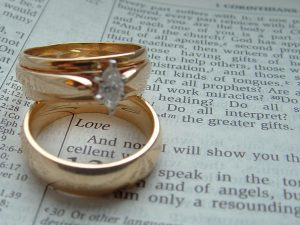
To find out more about what the Catholic Church teaches about marriage, click here.
A) Meetings with the Priest
Meetings with the Priest: (most meetings will take about an hour)
- Get to know priest, fill out Pre-nuptial Questionnaire and receive packet for the Marriage
- Fully Engaged test, expect about one and a half hours
- Go over results of Fully Engaged Test
- First session on the Fully Engaged Book
- Second session on the Fully Engaged Book
- Third Session on the Fully Engaged Book
- Fourth Session on the Fully Engaged Book
- Fifth Session on the Fully Engaged Book
- Sixth Session on the Fully Engaged Book
- Go over the ceremony
B) Checklist
- Pre-nuptial Questionnaire: Call in and set up an appointment at 1-815-232-8271
- Fully Engaged test: Set up time with priest.
- Gift of Self Marriage Preparation Retreat: (Spanish) Click on the link and fill out the register form.
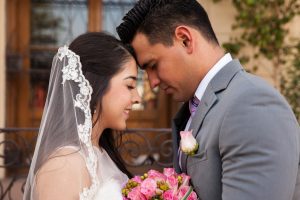
- NFP Seminar: This is no longer optional as of July 1st, 2023. Use the link to find the times. Fill out the form and send through the mail or call the phone number on the brochure.
- Witness Affidavit (two witnesses for the bride and two for the groom, usually parents or family. Call in to meet with the priest or deacon in the local Catholic Church to fill it out with you.)
- Baptismal Certificate for all who are baptized. Just contact place of Baptism and have them send a copy out. It should not cost anything.
- Marriage License (how to obtain)
- Contact Organist
- Gerry Reed
- Deb Roush
- Mary Ann Hasenour
C) Rules
- Wedding_Special Event Guidelines and Policies at St Joseph
- Wedding_Special Event Guidelines and Policies at St Mary
- Guidelines of the Diocese: link to diocesan web site
Holy Orders
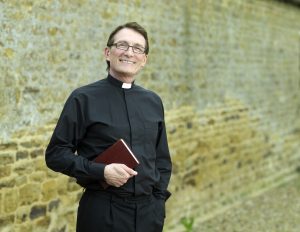 Holy Orders are not simply orders where somebody tells you what to do. It is when God calls men to be His holy priests and deacons to serve the people as a living sacrifice. Because it is a living sacrifice, it is a daily surrendering to God’s will so that God may shepherd His people. Why would He call mere men to do this? John recalls in his Gospel account, “(Jesus) said to them again, ‘Peace be with you. As the Father has sent me, so I send you.’ And when he had said this, he breathed on them and said to them, ‘Receive the holy Spirit. Whose sins you forgive are forgiven them, and whose sins you retain are retained.’” (Jn 20 21-23)
Holy Orders are not simply orders where somebody tells you what to do. It is when God calls men to be His holy priests and deacons to serve the people as a living sacrifice. Because it is a living sacrifice, it is a daily surrendering to God’s will so that God may shepherd His people. Why would He call mere men to do this? John recalls in his Gospel account, “(Jesus) said to them again, ‘Peace be with you. As the Father has sent me, so I send you.’ And when he had said this, he breathed on them and said to them, ‘Receive the holy Spirit. Whose sins you forgive are forgiven them, and whose sins you retain are retained.’” (Jn 20 21-23)
Jesus understands that we need to hear words and see his work done to help us have faith in His mercy and love. It is through His priest that God gives us His grace. It is His work, not the work of the priest. The words of the sacraments we receive from the priest come from Jesus himself. Jesus is not limited by the sins of a priest. The mercy of God cannot be thwarted by sin; Jesus conquers sin! It is Jesus who baptizes, confirms, consecrates the bread and wine, marries, anoints and ordains.
Jesus chose Twelve Apostles as his first priests and bishops. The Apostles quickly realized they needed help, and ordained more men by laying hands on them (Acts 6:6 & 13:3). The Holy Spirit came upon them so they could do this holy task. This is how it went through the centuries. Only a bishop consecrated by the Pope can ordain a priest. This ensures the promise given to the Church that Jesus will always be guiding the Church in the gift of the Holy Spirit, the same Holy Spirit given to those men in Acts. This is known as Apostolic Succession. Apostolic Succession ensures the correct interpretations of Scripture and right moral teaching through the guidance of the Holy Spirit. For more scriptural references, look through First and Second Timothy, Titus and the book of Hebrews.
The priest has many responsibilities. A priest can baptize, celebrate Mass, anoint, witness a marriage, absolve sins in confession, and confirm with the permission of the bishop. Outside of the sacraments the priest preaches, teaches, prays funerals and wakes, gives spiritual advice, visits those in need, blesses people, places and things, leads in prayer, and can do many more things.
In order to become a priest, a person must be a single male, confirmed in the Catholic Church and a practicing Catholic. The practice of the Catholic Church is that the person is not married. See Mt 19:12 for a scriptural reference. If you are discerning if Jesus is calling you to be His priest, you can contact the Diocese of Rockford at 1-815-399-4300 or click here for the website. Becoming a priest is not about our will, but God’s will. Assuming no previous college classes, it is expected to take four years for a bachelor’s degree in Philosophy, and then four years for a Masters in Theology.
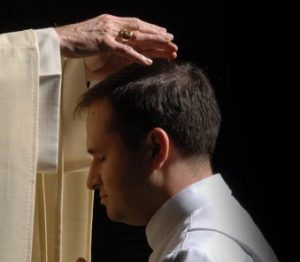 Deacons can baptize, witness a marriage and assists the priest at Mass. Deacons are considered an “Ordinary Minister of Holy Communion.” Deacons are expected to distribute Holy Communion at the masses they attend. They also help in many things in the parish, from running ministries and even preaching. Deacons cannot absolve sins or pray Mass. Deacons are male, confirmed Catholic and practicing the faith. Deacons can be married, but once ordained, they can not remarry. For scriptural reference, look up 1 Timothy 3:8-13. If you think you may be called to this ministry, contact your parish priest. To see more click here.
Deacons can baptize, witness a marriage and assists the priest at Mass. Deacons are considered an “Ordinary Minister of Holy Communion.” Deacons are expected to distribute Holy Communion at the masses they attend. They also help in many things in the parish, from running ministries and even preaching. Deacons cannot absolve sins or pray Mass. Deacons are male, confirmed Catholic and practicing the faith. Deacons can be married, but once ordained, they can not remarry. For scriptural reference, look up 1 Timothy 3:8-13. If you think you may be called to this ministry, contact your parish priest. To see more click here.
Religious life is a way to grow closer to Jesus in works or contemplation. In order to become a religious, you need to be a confirmed Catholic, practicing the faith and not married. Religious make vows of poverty, chastity and obedience. These are a giving up of good things for the kingdom of God. There are many communities of religious life that do many different things and have different charisms. Dominicans are a teaching order; they teach. Franciscans serve the poor. The Poor Clares and Benedictine orders are more contemplative, meaning they pray more. There are hundreds of them in the US. If you are thinking of becoming a religious, check out the diocesan web site on some of the religious orders that are around.
Anointing of the Sick
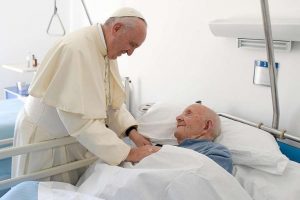 Anointing of the sick was done even in the times of James the Apostle. He wrote, “Is anyone among you suffering? He should pray. Is anyone in good spirits? He should sing praise. Is anyone among you sick? He should summon the presbyters of the church, and they should pray over him and anoint (him) with oil in the name of the Lord, and the prayer of faith will save the sick person, and the Lord will raise him up. If he has committed any sins, he will be forgiven.” (James 5:13-15) In Anointing of the Sick, the person who is sick receives grace for physical and/or spiritual healing. It has the power to forgive sins and makes them ready to meet Jesus if God calls. It is a great source of comfort and peace for the sick person and family. Many families have great experiences of peace in this holy sacrament.
Anointing of the sick was done even in the times of James the Apostle. He wrote, “Is anyone among you suffering? He should pray. Is anyone in good spirits? He should sing praise. Is anyone among you sick? He should summon the presbyters of the church, and they should pray over him and anoint (him) with oil in the name of the Lord, and the prayer of faith will save the sick person, and the Lord will raise him up. If he has committed any sins, he will be forgiven.” (James 5:13-15) In Anointing of the Sick, the person who is sick receives grace for physical and/or spiritual healing. It has the power to forgive sins and makes them ready to meet Jesus if God calls. It is a great source of comfort and peace for the sick person and family. Many families have great experiences of peace in this holy sacrament.
Who can be anointed? Anybody who is Catholic and is in any way in danger of death can be anointed. By danger of death we mean anybody who is going under surgery that requires anesthesiology. The person should not fear that they will die simply because they are being anointed. If this person has left the Catholic Church, they may still be anointed if they desire to come back home to the faith. Confession is part of the rite. The person must be alive to receive, however a priest may bless the body if the person has already passed.
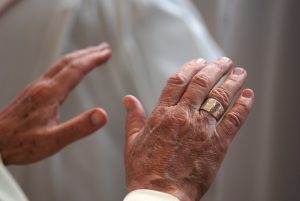 How to get anointed or have someone anointed? If there is surgery, a person may come in to the office or ask the priest after Mass for an anointing. Most of the time the sickness catches us off guard. If the person is in the Hospital and is Catholic, make sure the nurses are told that the sick person is Catholic so a Priest will know to come and visit them. It may be good to carry a Call a Priest card so you can be anointed in case of emergency and you cannot communicate. (Link) Call the Office to let them know you or someone you know wants to be anointed. Give the Name and contact information. The priest will be happy to come out and anoint.
How to get anointed or have someone anointed? If there is surgery, a person may come in to the office or ask the priest after Mass for an anointing. Most of the time the sickness catches us off guard. If the person is in the Hospital and is Catholic, make sure the nurses are told that the sick person is Catholic so a Priest will know to come and visit them. It may be good to carry a Call a Priest card so you can be anointed in case of emergency and you cannot communicate. (Link) Call the Office to let them know you or someone you know wants to be anointed. Give the Name and contact information. The priest will be happy to come out and anoint.
How Many times can a person be anointed? There is no limit. There are situations where a person is in a condition for years when the health fluctuates and looks like the person may die. Each time this happens, you can call for the priest. Generally speaking, if the person has been anointed within the past week or two, there is not an urgency.
